Dyson OnTrac review: big, bold and often brilliant
Dyson's first-ever dedicated headphones, OnTrac, are large, long-lasting, and dollop out lashings of well-controlled bass

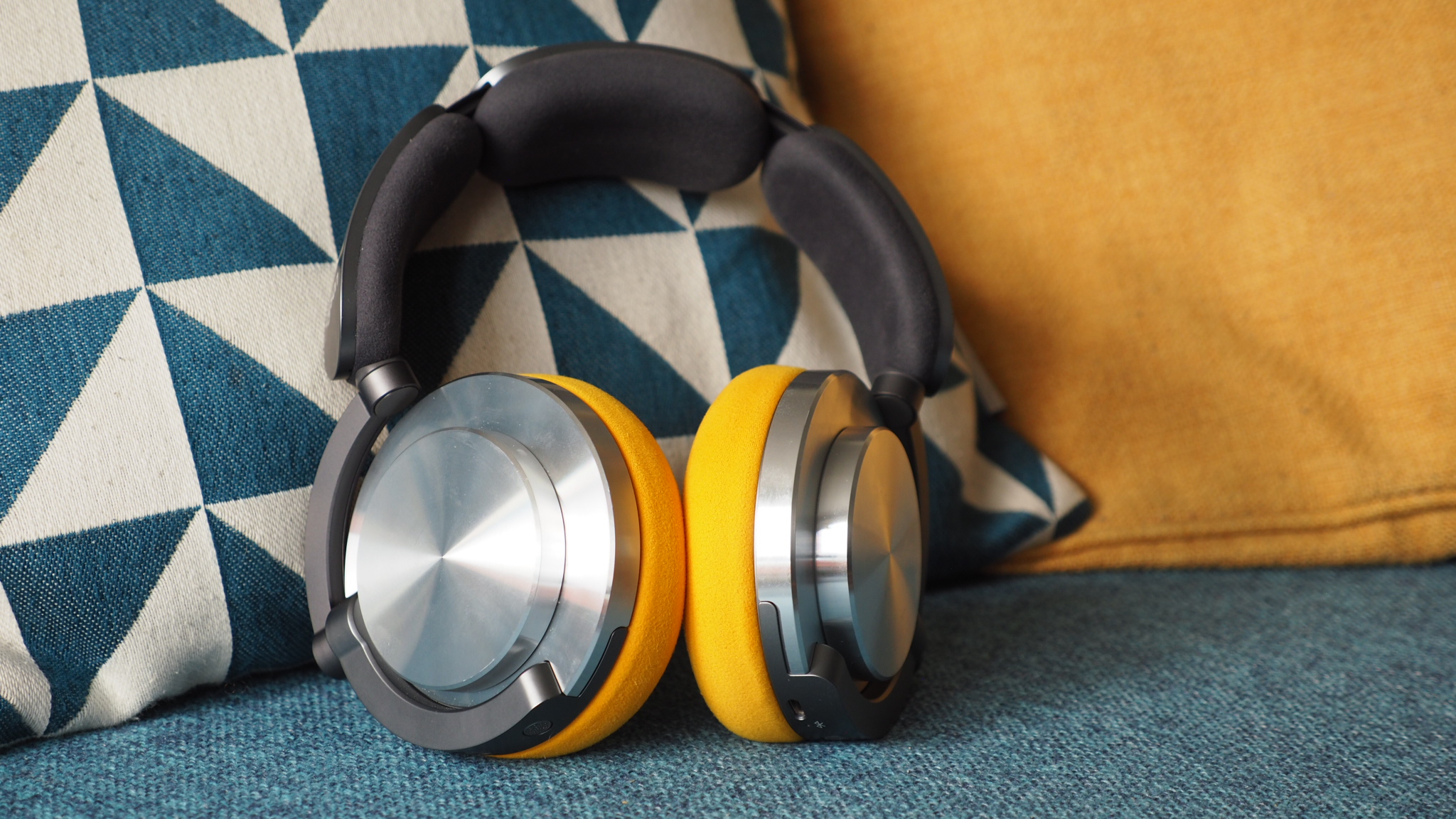
Dyson's dedicated headphones debut enter a bustling market that's not short of capable competition. Aiming to deliver on a unique selling point, these headphones' customisable earcups and earcaps make for a fun visual experience – although it's ultimately a non-essential. While the design may capture your initial attention – for better or worse, as these large-scale cans aren't going to suit all tastes – it's the big-deal sound quality and lashings of well-controlled bass that's going to maintain it. Add capable active noise-cancelling (ANC) – albeit Bose has the upper hand when it comes to sound-blocking – and battery life that lasts for yonks, and Dyson's got an exciting new headphones prospect on its hands. One that's likely to split opinion, though.
-
+
Big-deal sound quality with deep, well-controlled bass
-
+
Customisable design is fun – although non-essential
-
+
Comfortable for long-term wear, despite scale
-
+
Battery life that lasts and lasts
-
-
Active noise-cancelling rivalled by more complete competitors
-
-
Big-scale design simply won't suit all wearers
-
-
No 360-degree or spatial audio features
-
-
No multi-point Bluetooth connectivity
Why you can trust T3
Dyson revealed its first-ever dedicated headphones earlier this year and surprised both established audio-makers and the public alike with its unique, customisable take on its vision for the best headphones. I initially wrote about the OnTrac's best features upon their reveal, whilst pondering whether Dyson's brand-name (and pricing) would resonate with prospective new customers.
I've had the Dyson OnTrac on test for a full week for this review, during which time I've used them for over 18-hours of flying – which I've written about in a separate feature, here – and put them through the wringer in many other public scenarios to see whether Dyson's claims of making a pair of the best noise-cancelling headphones also stands up to scrutiny.
It's been an insightful experience testing these new headphones fully, as it's adjusted some of my initial assumptions, while providing the opportunity to realistically test the OnTrac's 50-hour battery life claims, comfort levels, overall sound quality and active noise-cancelling (ANC) capabilities. So what's the verdict?
Dyson OnTrac: Price & Availability
First thing's first, you'll need to be prepared to pay a premium level for these premium headphones, with the OnTrac launching at £449 in the UK, $499 in the USA, and AU$799 in Australia. That puts them close to or on par with many of the usual suspects: from Apple's AirPods Max, to Bose's QuietComfort Ultra Headphones.
That's not the full picture, as such, because the OnTrac's big sell is that the earcups and earcaps are interchangeable, with thousands of potential combinations allowing for personalised customisation. Except these are accessories, sold separately, with each pair priced at £49 ($49/AU$79) per purchase.
Dyson OnTrac review: Design & Setup
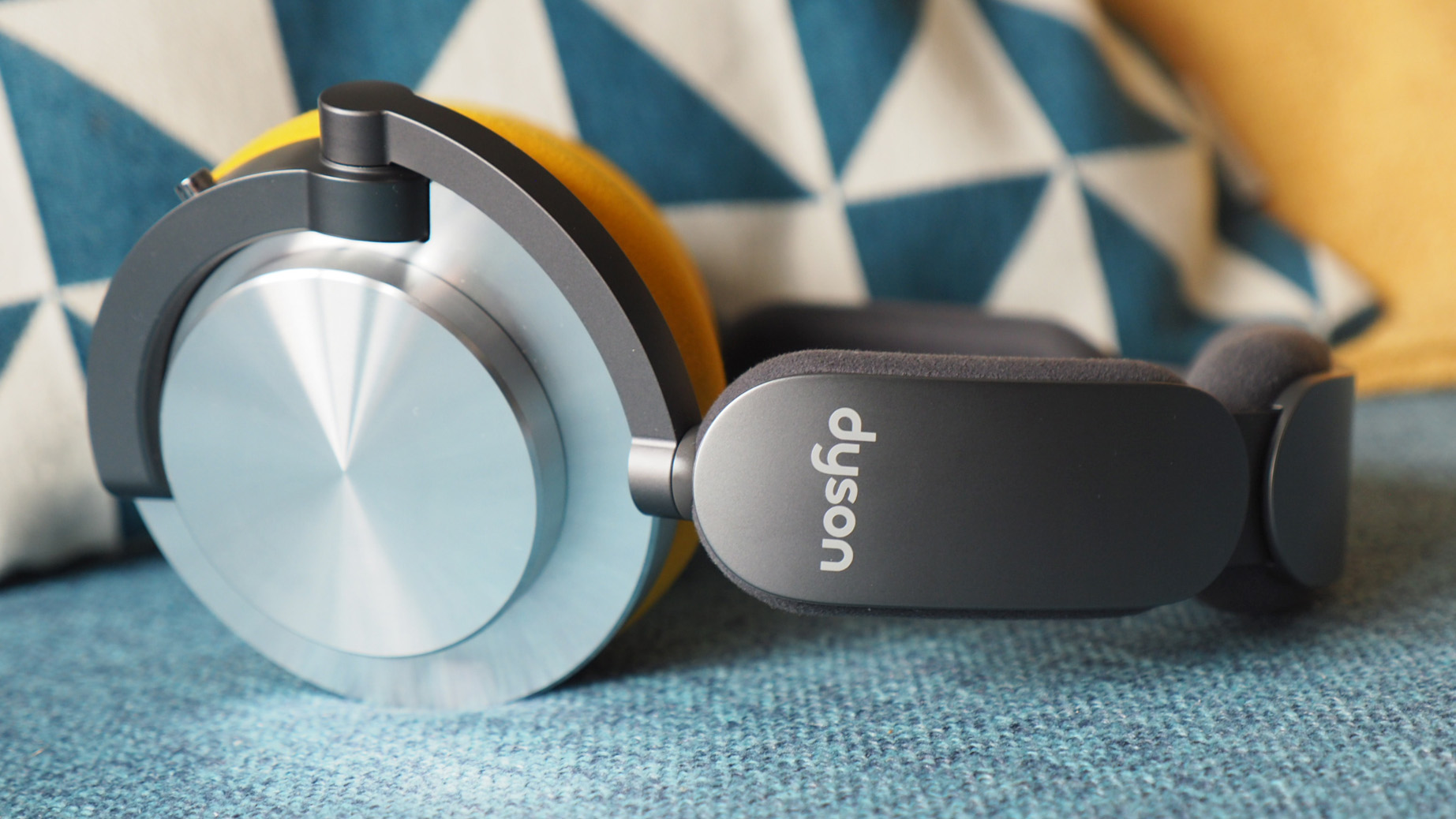
While you can't pre-specify your OnTrac's unique look out of the box, the headphones do come in four available options: CNC Aluminium (yellow earcups, silver earcaps), CNC Copper (blue and copper), Ceramic Cinnabar (black and coral), CNC Black Nickel (black and dark silver). There's no price variation whichever you choose.
I chose the CNC Aluminium option, as I think the body, headband and cushioning's mid/dark-grey finish is the most neutral out of the lot. A pair of blue earcaps and pink earcups later and I'd created a unique-looking pair of headphones. Fitting either is super-easy too – a simple twist-lock system for both takes mere seconds and is no bother to master.
Get all the latest news, reviews, deals and buying guides on gorgeous tech, home and active products from the T3 experts
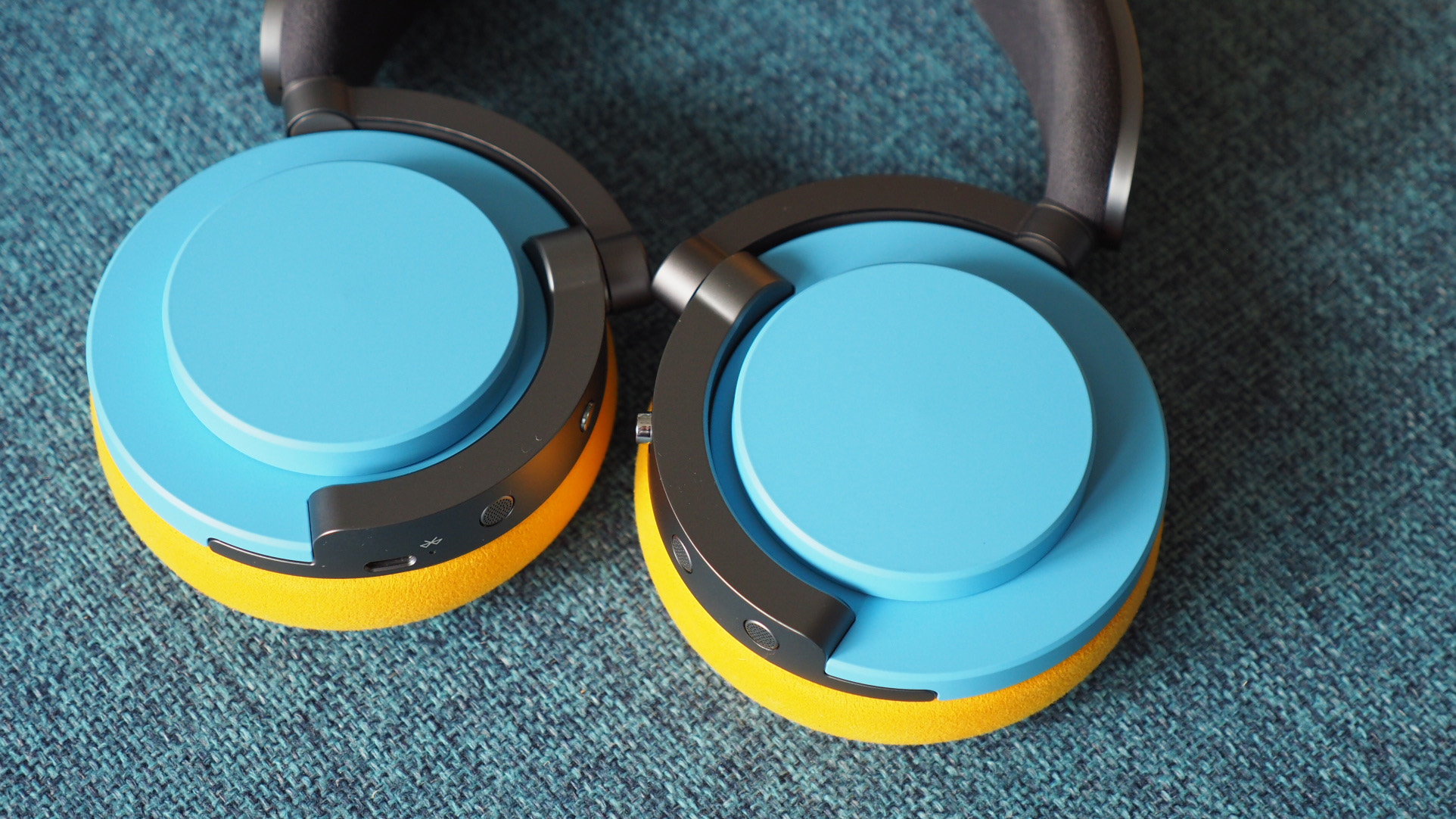
Choosing those accessories, if you elect to do so, might be one of the more taxing decisions you'll have to make with the OnTrac, though. I'd advise, where possible, to get an in-person look – as the physical finish may differ compared to what you expect. The blue earcaps, for example, are very matte – and look a little less sophisticated than I'd hoped.
So what else do you get in the box? There's the included carry-case, which as I mentioned in my OnTrac travel feature, is a simple-yet-genius bit of design work. The case looks like a hardshell front-on, but pull the headphones out from within and it collapses to being flat – which is so useful when travelling, to eliminate wasted space, as it's about as thin as one of the best phones of today. There's no zip to faff around with either, which is refreshing.
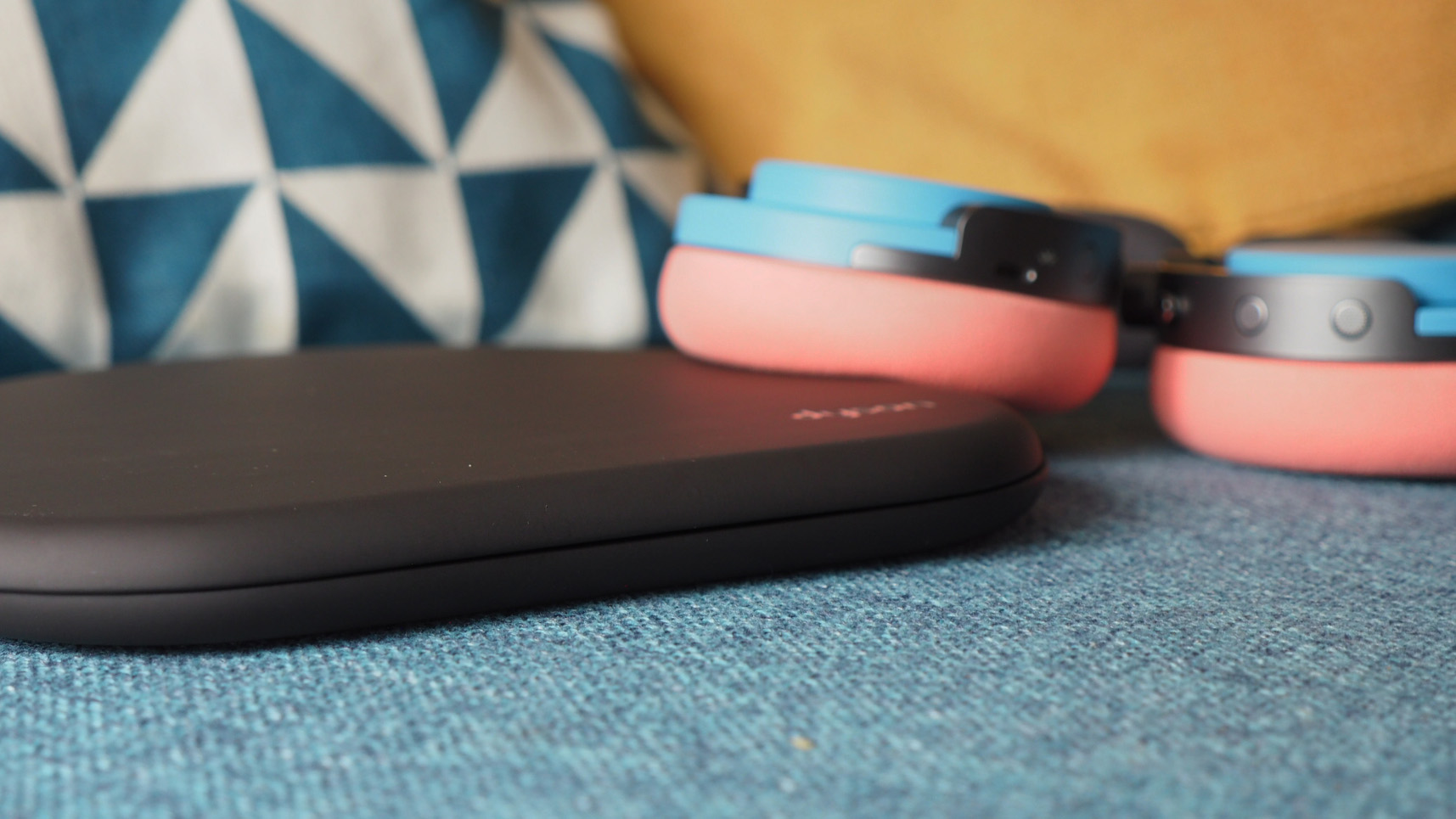
There's little else inside the box, though, with a USB-C cable living inside a little cardboard container – note, there's no wall plug, you'll need to find your own for charging – and some paper manuals. I wasn't expecting loads of extras, of course, but as there's no 3.5mm socket on these headphones there's no additional cable present (you can buy an adapter, if you want, for wired listening).
While it's not a requirement to use the MyDyson app in conjunction with the OnTrac, it definitely delivers a more thorough experience. Download it for free on Android or iOS operating systems and you'll gain access to a trio of EQ presets and some live information tracking the sound levels, which is mesmerising and, at times, insightful.
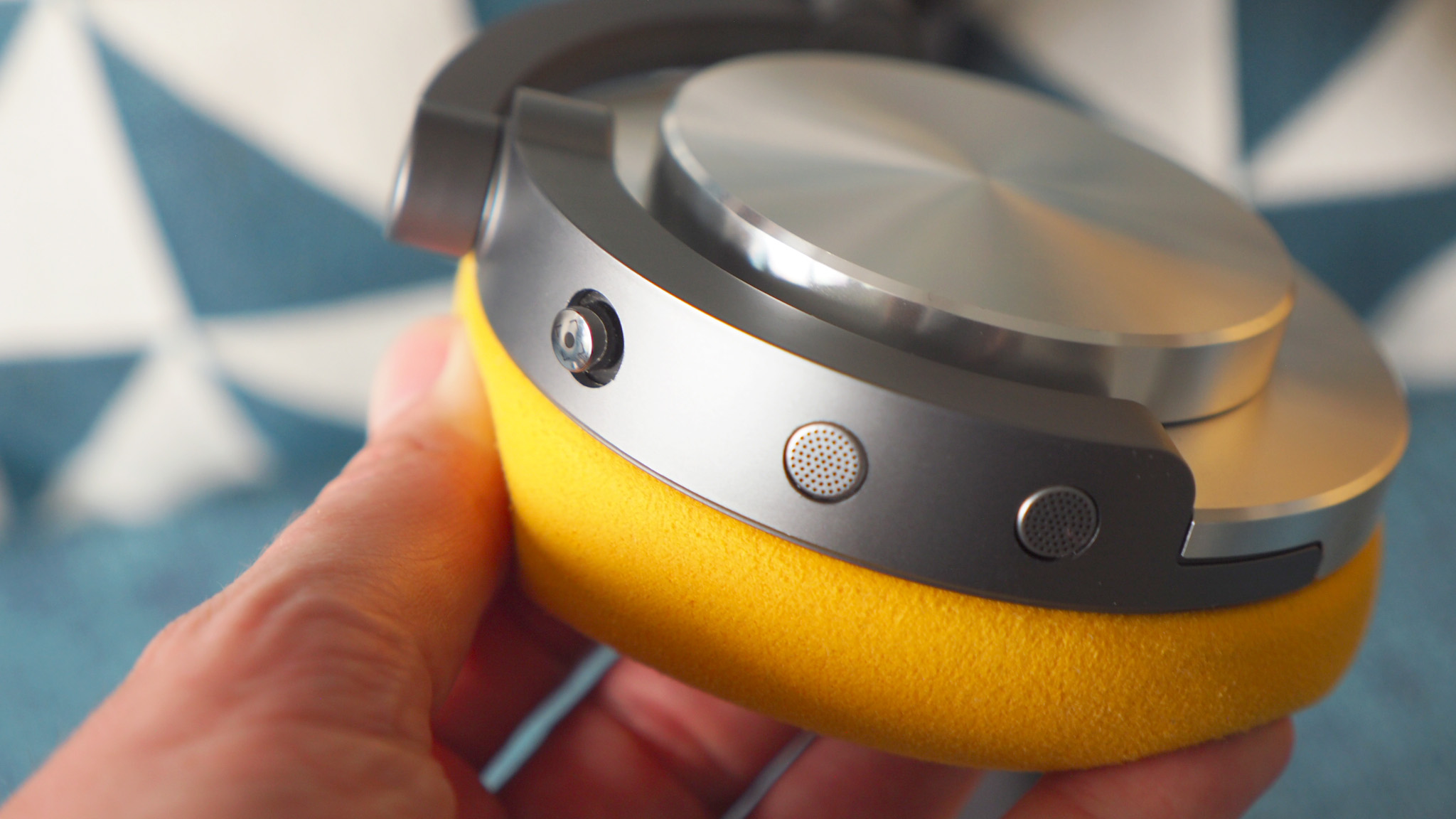
Forego the app, or use the OnTrac in conjunction with it, however, and the on-body controls are multi-faceted. There's the facility to tap-control by striking either earcup, which will cycle the ANC's Transparency mode on and off by default. Button-wise, there's an on/off pairing one on the left earcup (which you'll need to use a lot, as without multi-point connectivity you'll be using it for device switching), while a joystick-like controller on the right earcup can adjust volume, skip tracks and play/pause in a less-than-conventional way – but I think it's a really fun, unique take.
In terms of design, I suspect the OnTrac will divide opinion. There's no escaping that these are large-scale headphones, with a touch more than weight than some competitors owed to large battery capacity. I've found them very comfortable to wear for hours-long listening sessions, mind, as the clamping force is very well judged indeed – when the headphones are worn, anyway, as for round-the-neck wearing I've found the positioning somewhat jarring.
Dyson OnTrac review: Sound Quality
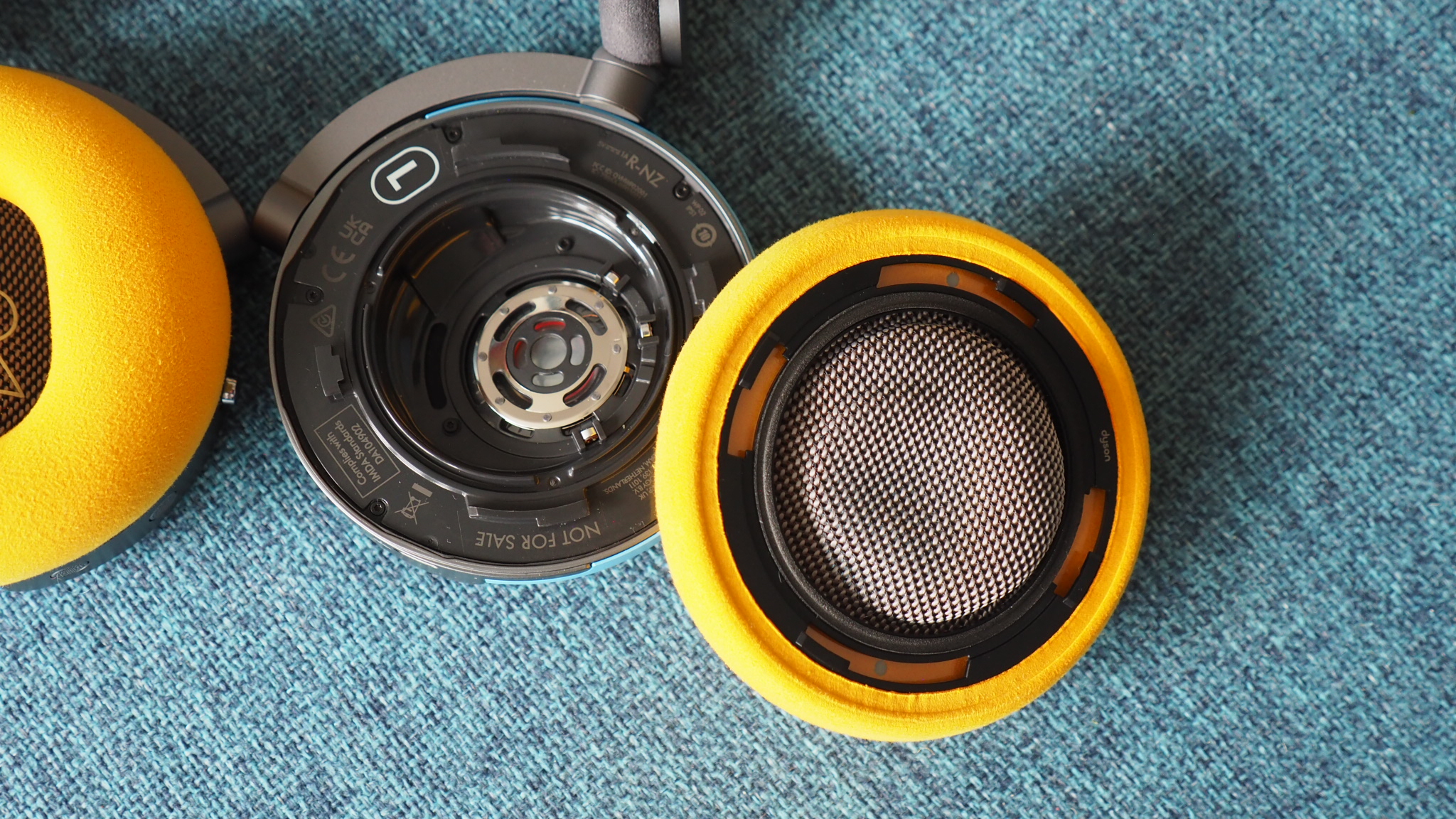
While I've grown to enjoy the OnTrac's looks more and more during my week of review time, it's the sound quality that has impressed me from the off. Like the big-scale design, there's no escaping this is big-scale audio – which I'd go so far as to call massive at times (and in the best of ways).
That comes down to the all-new 40mm neodymium drivers, said to deliver from 6Hz at the low-end, through to 21kHz at the high-end. That single-digit entry point is quite a statement: few competitors, unless we're talking about the best wired headphones specifically, aim to handle such bass-capable delivery.
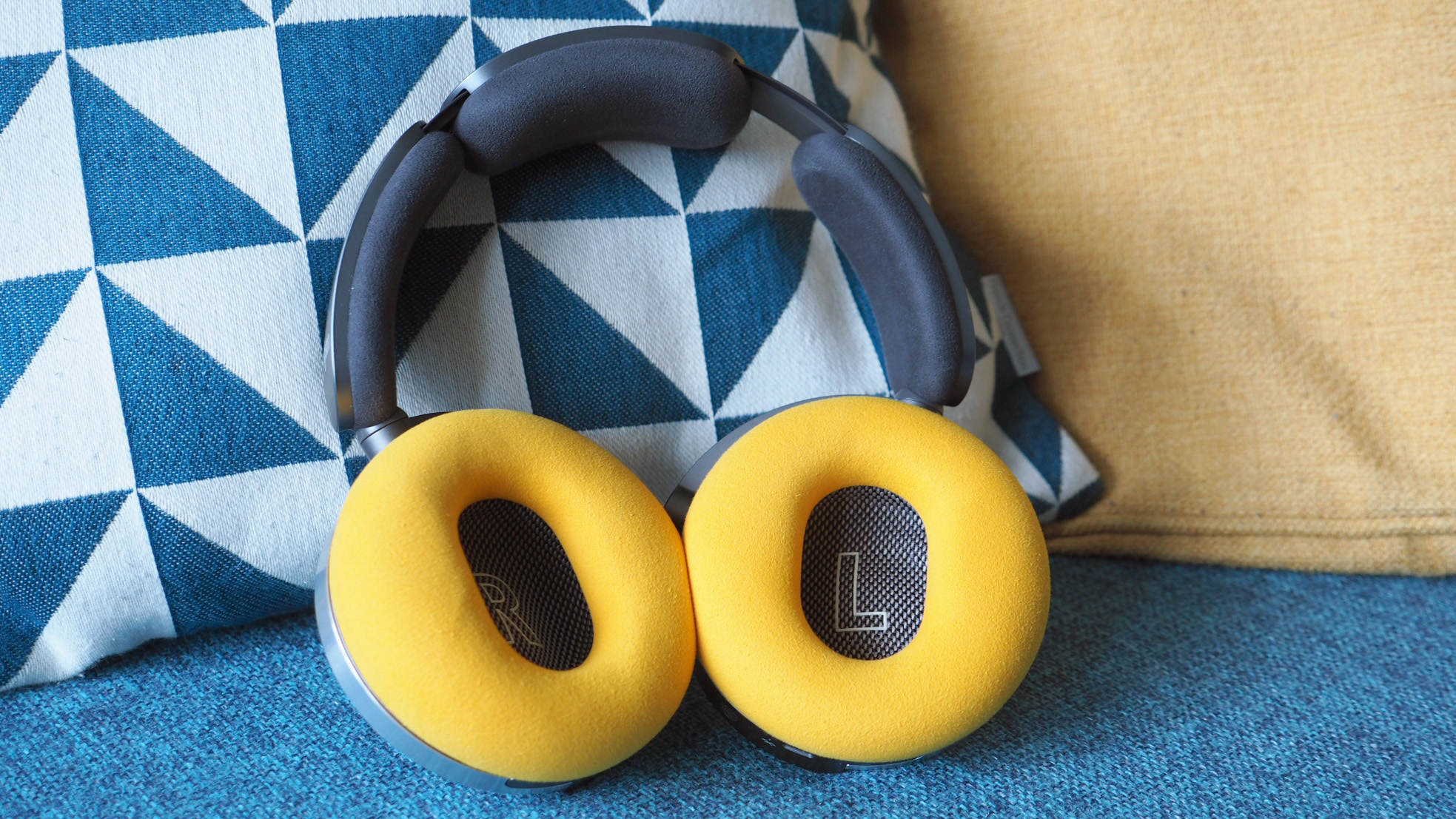
I must say, however, that just because the headphones can cater for such low-end frequencies, doesn't mean that content does. Most music producers roll-off anything sub-20Hz, for example, to keep mixdowns clean – and because it's inaudible. Nonetheless, the bass impact of Dyson's headphones slaps – yet it's well-controlled enough to avoid any muddiness, for a really striking and driving listen.
That bass doesn't disrupt any other part of a recording, however, with ample mid- and high-end delivery fusing together coherently, enough space between, for a wide soundstage courtesy of the large drivers within those big earcups.
It's wide in a stereo-only way, though, as there's no three-dimensional audio capability here – no psychoacoustic trickery or spatial audio, as per many competitors. With no 360-degree audio you can therefore rule out Dolby Atmos, which feels like an oversight in this market today.
Dyson OnTrac review: ANC & App
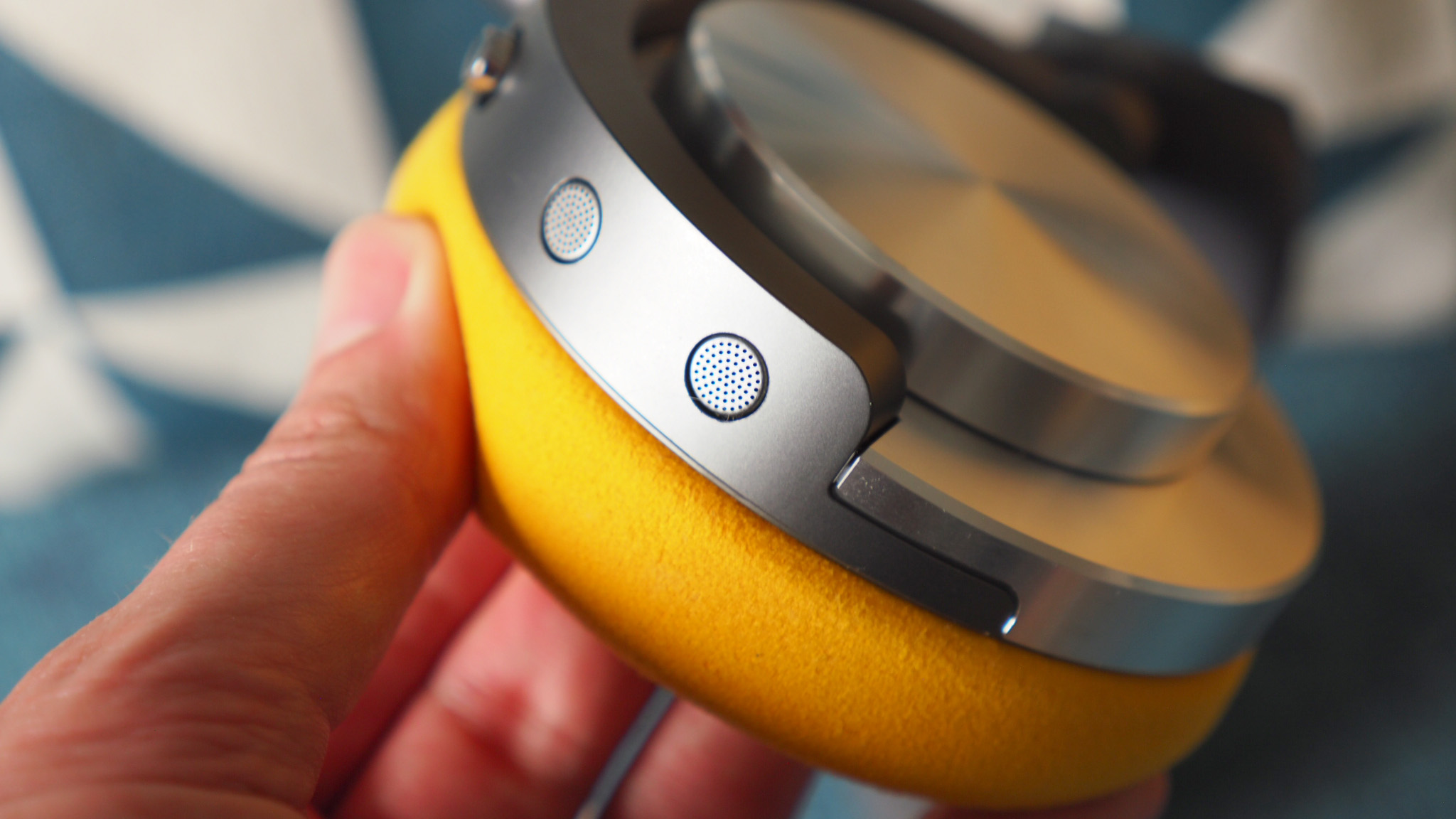
Sound quality is part-dependent on another important system: the OnTrac's active noise-cancelling (ANC), which uses eight microphones to sample ambient sound hundreds of times per second to adjust for it in real-time, in what Dyson is calling the best ANC going. I confess, it's good, but there are competitors that can deliver even more in my view.
The OnTrac's ANC can either be off or switched on in Isolation or Transparency modes. The latter of those two permits more mid-frequency sound to pass through, for assisting when listening to conversations, for example. I'm not a fan of the Transparency mode in headphones in general, but it's prevalent in such products – and people will absolutely expect it.
Switch from Transparency to Isolation and that mid-level hiss or hum is significantly reduced – but unlike with many other competitor headphones, I can still get a whisper of mid-level ambient sounds, such as conversations. I'd prefer the full blot-out style of the Bose QuietComfort Ultra Headphones myself, but ANC is a touchy subject – other brands, such as Bowers & Wilkins' Px7 S2e, go super-delicate on the ANC, which some people may prefer.
Having ANC active is an essential in my view, as it creates a more engaging sound profile overall. You can't manipulate the ANC levels any further, with Dyson doing that heavy lifting itself – the real-time monitoring within the MyDyson app is fascinating to look at, showing the internal and external decibel levels and how these relate to recommended (i.e. not damaging) sound levels.
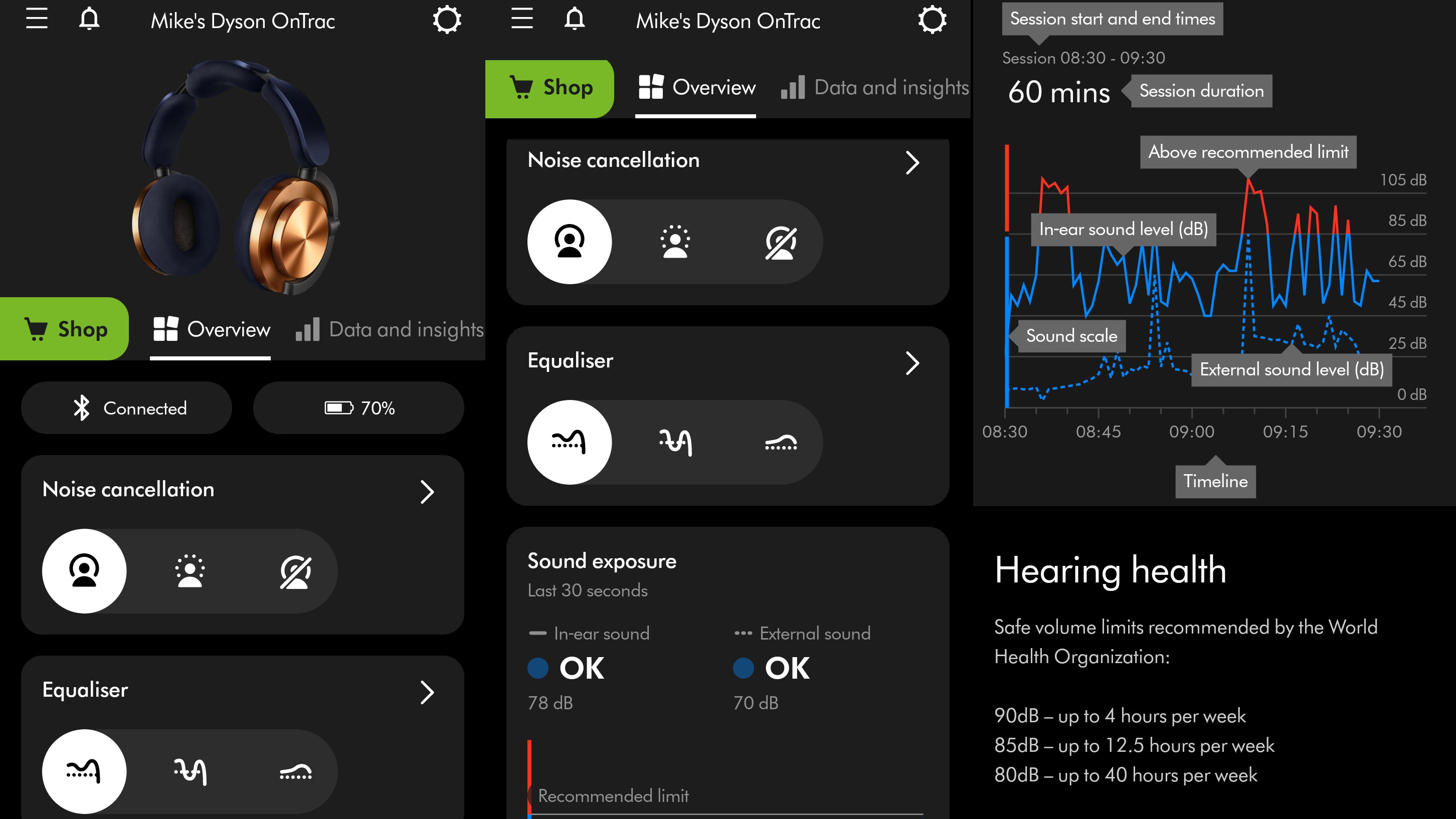
Why, then, the double-tap of an earcup generates a noise upon Isolation's activation to such a high sound level (it's in the red, as per Dyson's own measure) seems like a teething issue. I think there's a bit more work to be done with the app, really, as I've sometimes loaded it up and not had access to either the ANC or EQ options (they're just faded out). I've also found settings to not remain consistent between different products' Bluetooth connections, so I suspect some product-use feedback will inform a future app update.
Switching between products is also more long-winded than it ought to be. No multi-point Bluetooth connectivity (it's v5.0 here) means I've had plenty of press-and-hold of the connection button to reactivate a connection. My devices recognise the Dyson headphones, but quick connections when switching between haven't been automatic for me. Don't expect Google Fast Pair or anything Apple-like in speed here then.
Lastly there's wired connectivity: the OnTrac are capable of this, using the USB-C port, but I've not been able to test it as, one, I've been away travelling and, two, I don't possess the necessary converter – Dyson will sell you one, but that's another accessory cost to add to your OnTrac shopping list.
Dyson OnTrac review: Battery Life
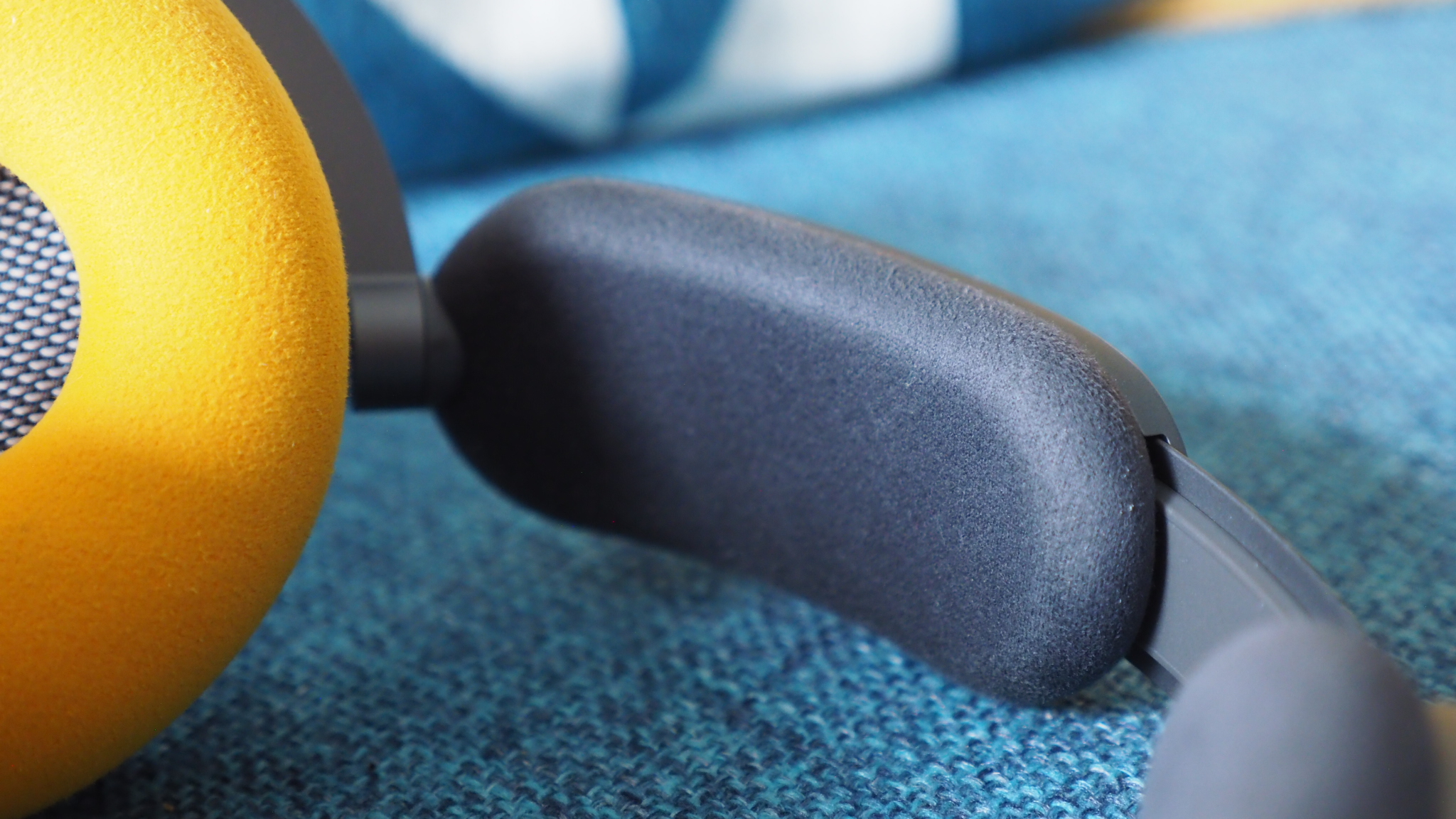
One of the Dyson OnTrac's other major sells is its claim for 50-hours of battery life per charge – and that's with ANC activated. That'll make many of its competitors pale by comparison, and I think is a handy feature to have if you're a forgetful charger or go away for extended periods.
So how is this achieved? Ultimately by packing in more battery capacity, which means the physical footprint has to extend somewhere – it's why the headband has two side-positioned bulges that look like additional cushions, but are in fact where the batteries are stored. It's a clever idea – although it looks a bit whacky – and I've found the weight and balance to feel right.
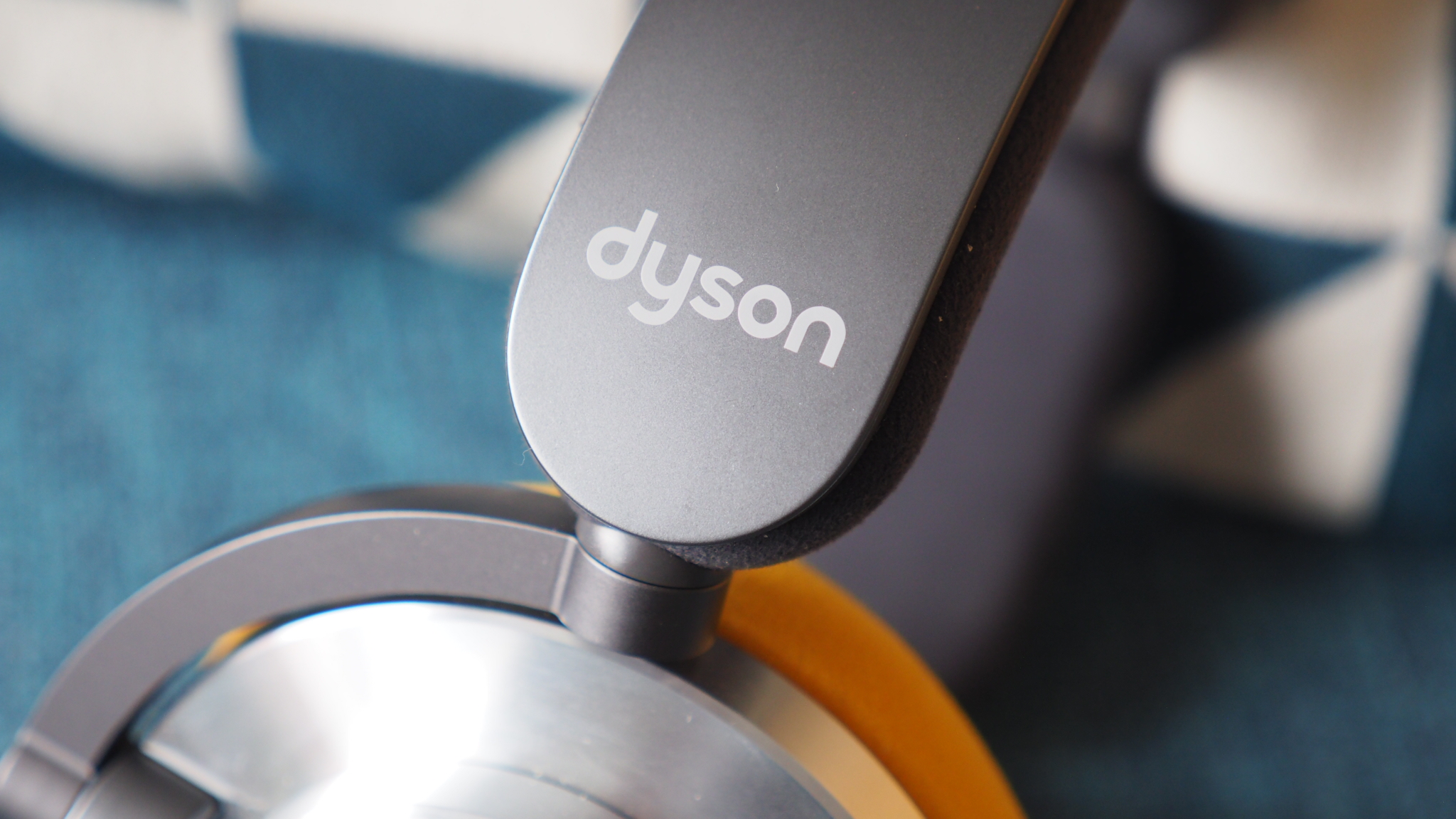
The bigger question, of course, is whether the headphones can actually deliver on those claims. Having been testing the headphones for a full week on this review – during which time I've been away from work on a long-distance trip – I tried my damnedest to drain the battery to zero across the week. But I failed!
Having used the headphones for almost 19-hours of international travel – you can read about it here – with plenty of idle not-listening moments in addition, the headphones were telling me that 50% battery remained. The app does only display this in 10% intervals, though, so how far from 40% I was at the moment in time wasn't clear.
Nonetheless, I would theoretically have achieved 40 hours of listening with ANC active, and as I listen at anti-socially loud volume levels I think that's pretty good going – and at the right volume level, I suspect 50-hours is entirely feasible. It's a good innings and a major point of appeal.
Dyson OnTrac review: Verdict
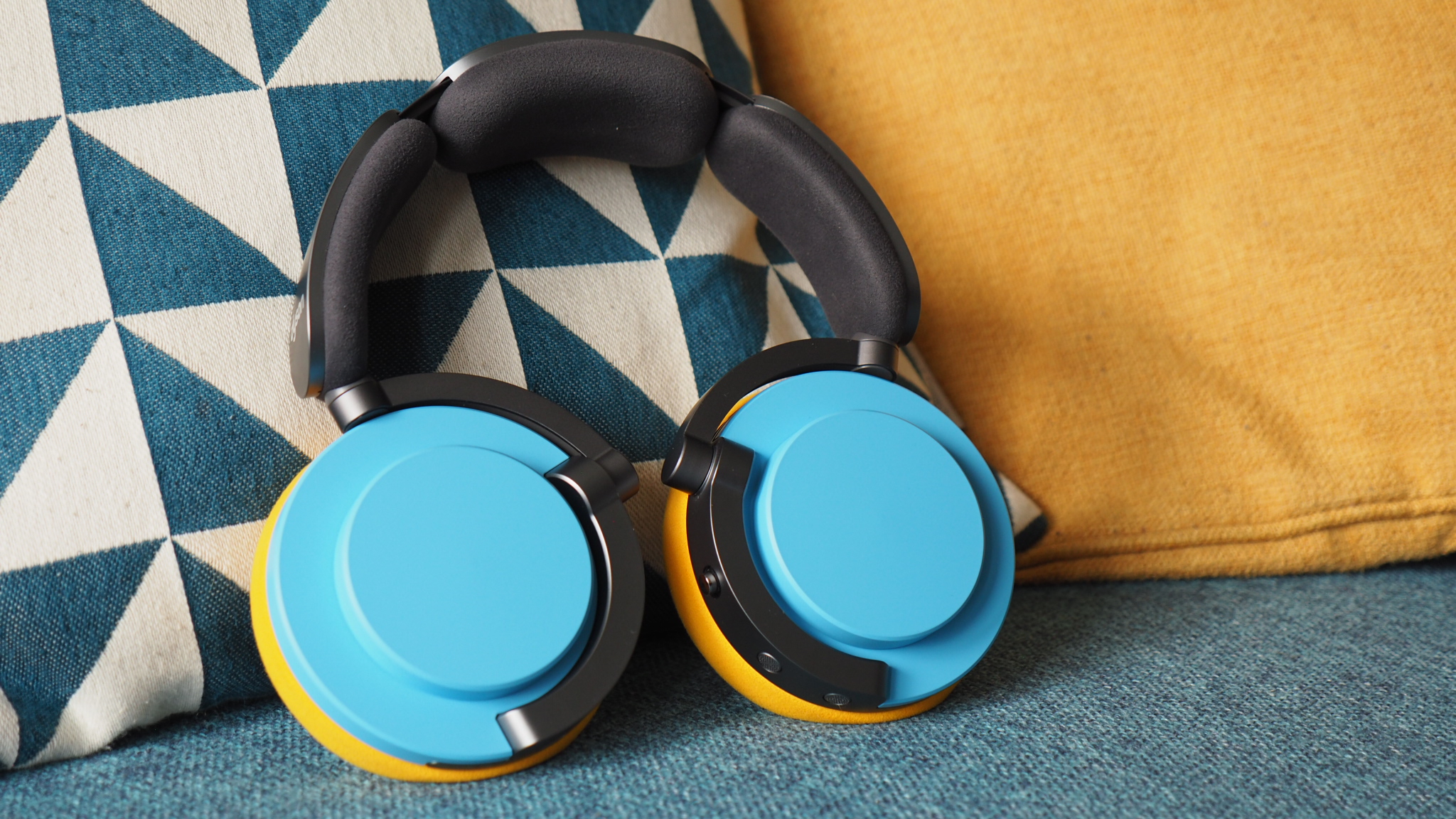
Dyson's dedicated headphones debut enter a bustling market that's not short of capable competition. Aiming to deliver on a unique selling point, these headphones' customisable earcups and earcaps make for a fun visual experience – although it's ultimately a non-essential and only further adds to the price.
While the design aesthetic may capture your initial attention – for better or worse, as these large-scale cans aren't going to suit all tastes – it's the big-deal sound quality and lashings of well-controlled bass that's going to maintain it. Even if you listen for hours at a time, the comfort here is on point.
Add in capable active noise-cancelling (ANC) – albeit Bose has the upper hand when it comes to blocking all ambient sounds – plus battery life that lasts for yonks, and Dyson's got an exciting new headphones prospect on its hands. Whether it's on track to obliterate the competition is largely going to depend on the public's uptake of a brand that's new to this particular game though.
Also consider
Dyson's first entry into the headphones market isn't short of worthy competition.
If you want more vacuum-like ANC and folding design for travel, then the Bose QC Ultra Headphones are the pick – with a similar asking price – that can't be beaten if you want train or plane silence.
For more at-home focused users, or if comfort is your most in-demand factor, then nothing can top the Sonos Ace. Also Sonos' first-ever headphones, the sound quality is less dynamic, but the comfort is unbeatable.
Apple user? Then the spatial audio-capable AirPods Max look, feel and sound tremendous – but the asking price is the highest of the lot on this list, which is an obvious barrier – and syncs super-easy with your Apple kit.
If the asking price is altogether too much, yet you still want premium headphones, then the Sony WH-1000XM5 are the ideal pick. Still considered among the best, you get excellent audio, comfort and ANC for a cut of the money.

Mike is T3's Tech Editor. He's been writing about consumer technology for 15 years and his beat covers phones – of which he's seen hundreds of handsets over the years – laptops, gaming, TV & audio, and more. There's little consumer tech he's not had a hand at trying, and with extensive commissioning and editing experience, he knows the industry inside out. As the former Reviews Editor at Pocket-lint for 10 years where he furthered his knowledge and expertise, whilst writing about literally thousands of products, he's also provided work for publications such as Wired, The Guardian, Metro, and more.
